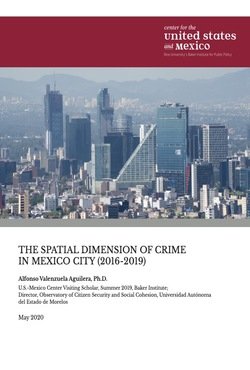The Spatial Dimension of Crime in Mexico City (2016-2019)
By Alfonso Valenzuela Aguilera
Crime exhibits specific geographical and chronological patterns in Latin American cities, and data on criminal activity allows scholars to trace spatial and chronological patterns down to specific neighborhoods and certain hours of the day in these cities. Over the last three decades, numerous studies have explored the relationship between crime, space, and time, and some studies have even established strong correlations between different patterns of land use and specific types of crimes. Few of these studies, however, have focused on the spatial configurations of criminal activity in cities and the conditions that elicit criminal activity in certain locations. Using recent crime data for Mexico City, this study employs a methodology based on crime location quotients to establish correlations that spatially characterize crime. This information can substantially improve public safety policies applied to urban contexts.
Houston, TX: Rice University’s Baker Institute for Public Policy, 2020. 25p.


